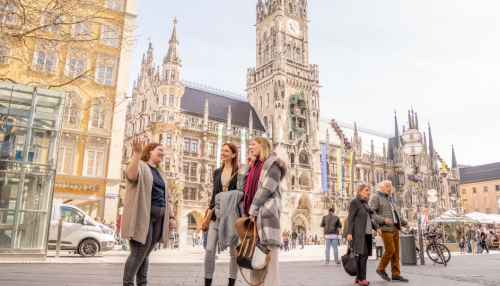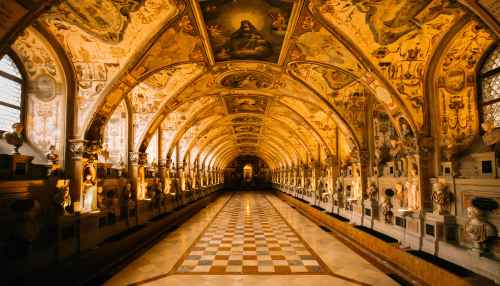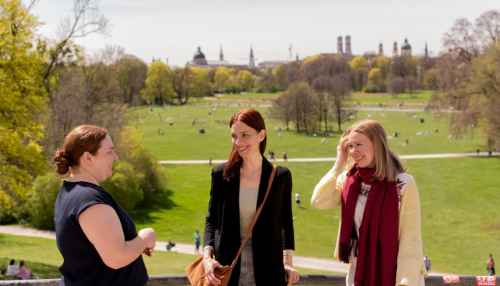Table Of Contents
- What Makes Munich Worth Visiting (Spoiler: It's Not Just Oktoberfest)
- How Many Days Do You Actually Need in Munich?
- When to Visit Munich (And When to Avoid the Crowds)
- Getting Around Munich: Public Transport That Actually Works
- The Real Munich: Beyond Marienplatz and Tourist Traps
- Beer Culture: More Than Just Oktoberfest
- Museums Worth Your Time (And Which Ones to Skip)
- Food Beyond Sausages: Where Locals Actually Eat
- Day Trips That Don't Require a Tour Bus
- Navigating Munich's Cultural Scene
- Language and Communication: Can You Speak English in Munich?
- Seasonal Experiences: Making the Most of Munich's Weather
- Getting to Know the Neighborhoods
- The Art of Slow Travel in Munich
- Planning Your Munich Experience
- Practical Tips for Munich Visitors
- Why Munich Works as a Travel Destination
- Beyond the Guidebook Experience
Look, I get it. You want to travel Munich without looking like you just stepped off a tour bus wearing a dirndl you bought at the airport. Good news: it's entirely possible to experience Munich, Germany, like someone who actually lives here, minus the lederhosen and the desperate need to photograph everything.
I've spent thirty-two years watching tourists stumble through my city, and frankly, most of them are doing it wrong. They're hitting the same tired spots, paying tourist prices, and missing the actual rhythm of Munich life. So here's your insider guide to Munich Germany – the real version, not the postcard one.
What Makes Munich Worth Visiting (Spoiler: It's Not Just Oktoberfest)
Is Munich worth visiting for tourists? Absolutely, but not for the reasons most travel guides tell you. Sure, we have castles and beer halls, but what makes this city special is how it balances tradition with a surprisingly progressive edge. You can drink a Mass in a 500-year-old beer garden, then catch experimental art in a converted industrial space twenty minutes later.
Munich isn't Berlin's edgy younger sibling or Hamburg's maritime cousin. We're Bavaria's sophisticated capital, where locals actually wear designer jeans to the opera and no one bats an eye. The city works because it doesn't try too hard to be anything other than itself.
The best part? Munich is compact enough that you can walk most of it, bike the rest – or join one of the many local bike tours, like those through the English Garden or along the Isar River.
How Many Days Do You Actually Need in Munich?
How many days do you need in Munich? Three days minimum if you want to scratch beneath the surface. A week if you want to understand why people move here and never leave. One day if you're just here to say you've been – but honestly, why bother?
Here's the thing about Munich: it's not a city you conquer in a weekend. It's a city you settle into. The magic happens in the spaces between the major attractions – in the conversation you have with the woman selling pretzels at Viktualienmarkt, or when you stumble into a jazz session at a wine bar you didn't know existed.
If you're planning a day trip approach, you're missing the point entirely. Munich rewards slow travel, not speed tourism.
Looking for a private city experience in Munich?
Explore the city with a local who plans a private day just for you; no groups, no scripts.
When to Visit Munich (And When to Avoid the Crowds)
What is the best month to visit Munich? May through September for weather, but October through April for authenticity. Summer brings the masses and the outdoor beer garden season, which is lovely but crowded. Winter brings Christmas markets and a more intimate city experience.
Here's what the guidebooks won't tell you: Munich in January is magical. The tourists have gone home, the locals reclaim their city, and you can actually get a table at the good restaurants without booking three weeks ahead. Yes, it's cold, but we have mulled wine and heated terraces, and the museums are blissfully uncrowded.
Summer is when the city comes alive outdoors. The English Garden fills with locals having impromptu picnics, the beer garden culture reaches its peak, and you can swim in the Isar River if you're brave enough to handle the Alpine water temperature.
Getting Around Munich: Public Transport That Actually Works
Forget what you've heard about German efficiency being a myth. Munich's public transportation system is proof that sometimes stereotypes exist for good reasons. The U Bahn and S Bahn networks will get you anywhere you need to go, usually on time, usually clean.
Buy a day ticket and use it. Don't try to walk everywhere like some sort of urban hiking enthusiast. Public transport here connects every neighborhood worth visiting, and you'll spend more time experiencing the city and less time nursing blisters.
The bus system fills in the gaps, though honestly, if you're sticking to the central areas, you won't need it much. The train connections to other parts of Bavaria are excellent if you're planning day trips to the Bavarian Alps or neighboring towns.
The Real Munich: Beyond Marienplatz and Tourist Traps
Everyone ends up at Marienplatz. It's inevitable. The new town hall is genuinely impressive, the Neues Rathaus glockenspiel is worth seeing once, and the square serves as a good orientation point. But if you spend your entire trip circling this area, you're missing the actual city.
The old town has its charms, but Munich's real character lives in neighborhoods like Glockenbachviertel, where young professionals drink natural wine and argue about art, or Schwabing, where students and academics create the city's intellectual buzz.
Walk through these areas instead of following the prescribed tourist routes. Duck into side streets, follow your nose to interesting smells, and stop when something catches your eye. This isn't a guided tour – it's real urban exploration.
What if your day in Munich was planned by someone who knows it — and you?
City Unscripted matches you with a local host who creates a private experience based on your interests, not a set route.
Beer Culture: More Than Just Oktoberfest
Yes, Oktoberfest happens here. Yes, it's massive and famous and completely overwhelming. But reducing Munich's beer culture to one two-week festival is like judging New York based solely on Times Square on New Year's Eve.
The real beer culture happens year-round in neighborhood beer gardens and traditional beer halls. Augustiner-Bräu isn't just a famous beer hall – it's where locals actually drink. The beer garden attached to it serves the city's best Mass, and you'll sit at communal tables with people who've been coming here for decades.
Beer garden etiquette: bring your own food or buy from the stalls, but always buy your drinks from the venue. Share tables – it's expected, not optional. And please, for the love of all that's holy, don't ask for light beer.
The Chinese Tower beer garden in the English Garden is tourist-heavy but authentic. If you want something more local, try Hirschgarten – it's the world's largest beer garden, but somehow still feels intimate.
Museums Worth Your Time (And Which Ones to Skip)
Munich has more museums than you can reasonably visit in a week, so choose wisely. The Deutsches Museum is genuinely world-class if you have any interest in science and technology. It's massive, plan a full day, and don't try to see everything.
The Asam Brothers built some stunning baroque churches that function as living museums of religious art. The Asamkirche is a masterpiece of baroque excess that somehow works perfectly in Munich's architectural landscape.
For something different, the Fishing Museum sounds quirky but offers genuine insights into Bavaria's relationship with its rivers and lakes. Plus, it's small enough to see in an hour, leaving time for more important activities like finding a good coffee.
Visit museums on weekday mornings when possible. Weekends bring families and crowds, and the peaceful contemplation that makes museum visits worthwhile gets lost in the shuffle.
Food Beyond Sausages: Where Locals Actually Eat
Munich has moved far beyond the sausage-and-pretzel stereotype, though both remain excellent when done properly. The city's restaurants reflect its international population and sophisticated palate.
Locals don't eat at the restaurants around Marienplatz. We eat in Glockenbachviertel, Schwabing, and Haidhausen. Look for places without English menus – not because we're exclusive, but because the best spots focus on food rather than tourist convenience.
The food scene here balances traditional Bavarian cuisine with international influences. You can get excellent Vietnamese pho, Turkish döner, and Italian pasta – often from family-run places that have been serving the same neighborhoods for decades.
Coffee culture has evolved significantly. Third-wave coffee shops exist alongside traditional cafés, and locals appreciate both. Don't expect Seattle-level coffee obsession, but don't settle for tourist café mediocrity either.
Tip
We match you with the right host, not just any guide.Want to experience the real Munich with someone who lives there?
A fully private experience, planned and led by a local host who tailors the day to you
Day Trips That Don't Require a Tour Bus
The Bavarian Alps are spectacular and accessible, but you don't need to join a tour to see them. The train system connects Munich to Alpine towns like Garmisch-Partenkirchen in about an hour.
Nymphenburg Palace technically counts as a day trip since it's outside the city center, but it's easily accessible by public transport. The palace and gardens showcase Bavaria's royal history without the crowds of Neuschwanstein.
Smaller Bavarian towns make excellent day trip destinations. Take the S Bahn to Starnberg for lake views, or head to Freising for brewery history and fewer tourists. These trips show you Bavaria beyond Munich without the tour bus experience.
Navigating Munich's Cultural Scene
Culture in Munich isn't just traditional folk dancing and lederhosen. The city has a thriving contemporary arts scene, excellent live music venues, and a sophisticated cultural calendar.
The opera house and concert halls book European masters alongside contemporary performers. Live music venues range from intimate jazz clubs to larger concert halls, and the programming reflects Munich's position as a major European cultural destination.
Locals support smaller venues too. Check out jazz sessions in wine bars, experimental music in converted industrial spaces, and art openings in gallery districts. This is where Munich's creative energy actually lives.
Language and Communication: Can You Speak English in Munich?
Can you speak English in Munich? Yes, especially in tourist areas, hotels, and restaurants. Most younger locals speak decent English, and service industry workers generally handle English-speaking visitors without problems.
That said, learning basic German phrases shows respect and often leads to warmer interactions. Locals appreciate the effort, even if your pronunciation is terrible. "Prost" (cheers), "Danke" (thank you), and "Entschuldigung" (excuse me) will serve you well.
The city's international business presence means English is commonly heard on the street and in professional settings. Munich functions as a global city while maintaining its Bavarian character.
Ready to plan your perfect day in Munich?
Start your experienceSeasonal Experiences: Making the Most of Munich's Weather
Weather in Munich varies dramatically by season, and smart travelers plan accordingly. Summer brings outdoor festivals, beer garden season, and comfortable walking weather. Winter brings Christmas markets, cozy indoor venues, and that special Central European winter atmosphere.
Spring and fall offer the best compromise – decent weather without peak season crowds. The city feels more authentically itself during these shoulder seasons, when locals reclaim their favorite spots from summer tourists.
Each season offers different advantages. Summer visitors get outdoor Munich at its peak. Winter visitors get intimate Munich with fewer crowds and more local interaction.
Getting to Know the Neighborhoods
Munich city consists of distinct neighborhoods, each with its own character. The center contains the obvious attractions, but the neighborhoods contain the actual life.
Maxvorstadt houses the university and many museums. Schwabing maintains its bohemian reputation despite gentrification. Glockenbachviertel attracts young professionals and creatives. Haidhausen offers excellent restaurants and a more relaxed pace.
Explore these areas on foot or by bike. Each neighborhood has its own restaurants, bars, and cultural venues. This is where you'll encounter Munich as a living city rather than a tourist destination.
The Art of Slow Travel in Munich
Munich rewards patience. The city reveals itself gradually to visitors who take time to sit in beer gardens, linger over meals, and conversation with locals. This isn't a city for aggressive sightseeing – it's a city for experiencing.
Spend time in places rather than rushing between them. Sit in the English Garden and watch the surfers on the Eisbach. Walk along the Isar River and understand why locals love their city's relationship with nature.
The best Munich experiences happen when you're not trying to have them. They occur in conversations with strangers, in discoveries of hidden courtyards, and in moments when the city feels like home rather than a destination.
Planning Your Munich Experience
Munich doesn't require extensive planning, but some preparation helps. Book restaurants in advance for dinner, especially on weekends. Check museum schedules and closing days. Understand public transport options and buy appropriate tickets.
Don't over-schedule. Leave room for spontaneous discoveries, longer conversations, and the kind of serendipitous experiences that make travel memorable. Munich offers plenty to see and do, but the magic often happens in the unplanned moments.
The city works best when you balance must-see attractions with neighborhood exploration, traditional experiences with contemporary culture, and tourist activities with local habits.
Practical Tips for Munich Visitors
Visitors to Munich should know a few practical details. Shops close on Sundays, except in tourist areas. Restaurants often close between lunch and dinner service. Tipping is customary but not excessive – round up or add 10%.
Cash is still king in many local establishments, though cards are increasingly accepted. ATMs are plentiful, and exchange rates are reasonable at major banks.
Safety isn't a significant concern in Munich. The city maintains low crime rates and efficient emergency services. Use common urban sense, but don't worry about walking alone or using public transport at night.
Why Munich Works as a Travel Destination
Munich succeeds as a destination because it doesn't try too hard to impress visitors. The city maintains its authentic character while accommodating tourism intelligently. You can have genuine local experiences without speaking German or knowing secret handshakes.
The city's size works in its favor – large enough to offer diversity and sophistication, small enough to feel manageable and intimate. Munich rewards both short visits and extended stays, both careful planning and spontaneous exploration.
Most importantly, Munich treats visitors as temporary locals rather than walking wallets. The city's hospitality is genuine, its attractions are substantial, and its culture is accessible without dumbing down.
Beyond the Guidebook Experience
Real travel in Munich happens when you stop following prescribed routes and start following your instincts. Skip the guided tour mentality and develop your own relationship with the city. Munich offers enough depth to support multiple visits and different approaches.
The city's greatest asset is its people – locals who are proud of their city without being precious about it. Engage with them, ask questions, and accept recommendations. Munich locals know their city intimately and share that knowledge generously.
This is how you travel Munich like someone who lives here: with curiosity rather than a checklist, with appreciation rather than consumption, and with the understanding that the best experiences often happen when you're not trying to have them.
Munich will reward this approach with memories that feel earned rather than purchased, stories that feel personal rather than generic, and an understanding of why this Bavarian capital continues to charm both visitors and locals who choose to call it home.
What if your day in Munich was planned by someone who knows it — and you?
City Unscripted matches you with a local host who creates a private experience based on your interests, not a set route.
Want to experience the real Munich with someone who lives there?
A fully private experience, planned and led by a local host who tailors the day to you
Meet Your Munich Hosts
A personalized way to explore Munich’s must-see landmarks beyond the tourist crowds.











